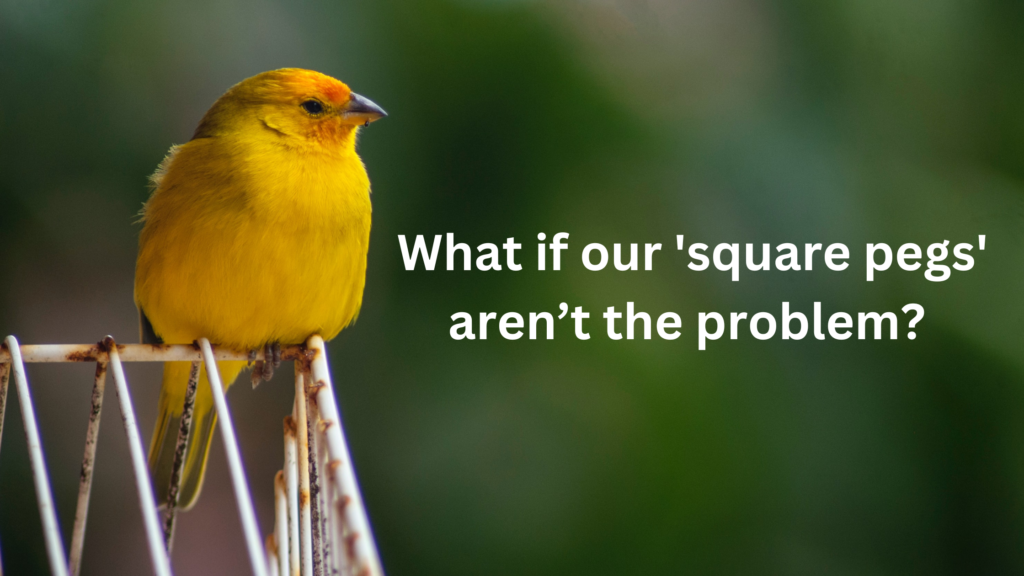The Canaries in the Mine, by Jo Symes

This text that follows is the Prologue from the book, Square Pegs: Inclusivity, compassion and fitting in – a guide for schools
What if our ‘square pegs’ aren’t the problem? What if they are actually the canaries in the mine, alerting us to the mounting problems in our education system?
In her book, Troublemakers: Lessons in Freedom from Young Children at School, Carla Shalaby (2017) discusses ‘animal sentinels’, animals which are purposefully used to provide advanced warning of disease, toxins and other environmental threats to humans. She explains that these species are selected based on their heightened susceptibility to particular hazards. They are often sacrificed to save us.
The most famous example is the canary, used in coal mines in the early 20th century to give advanced warning of deadly gases, such as carbon monoxide. Because these birds were small and had particularly sensitive respiratory systems, the poison killed them quickly, leaving the miners with enough time to get out and save themselves. What if, suggests the author, we saw our square pegs as such canaries?
“The child who deviates, who refuses to behave like everybody else, may be telling us – loudly, visibly, and memorably – that the arrangements of our schools are harmful to human beings. Something toxic is in the air, and these children refuse to inhale it. It is dangerous to exclude these children and silence their warnings.”
Shalaby, 2017: xxxiii
Shalaby learned the canary metaphor from Thomas, a father of a 5-year-old boy who could not – and would not – comply with the behavioural expectations of his kindergarten teacher:
“Though the child suffered a mood disorder, Thomas challenged the assumption that the disease made his son inherently broken or bad. Much like the canary’s fragile lungs, this child’s brain leaves him more susceptible to the harms of poison. He’s more sensitive to harm than the average child. Still, the problem is the poison – not the living thing struggling to survive despite breathing it. After all, in clean air, canaries breathe easily.”
Shalaby, 2017: xxii–xxiii
Look at our square pegs. Look at the list of children refusing to attend your school, with or without the knowledge/agreement/complicity/other of their parents [1]. Look at those who are constantly in trouble when they do attend. Look at those who have been excluded, shamed, moved on. Look at those in your bottom sets, in your nurture rooms, in your ‘special classes’, in your conscience. What are they saying? What warning are they giving you? What will you do now you hear them?

References
Shalaby, C. (2017) Troublemakers: Lessons in Freedom from Young Children at School. New York: New Press.

Footnotes
[1] This is discussed further in the Introduction [of the book, Square Pegs: Inclusivity, compassion and fitting in – a guide for schools]. Am I complicit if I prioritise my child’s mental health and knowingly agree not to force her into school? The law says I am. What do you say?
About the Author
Jo Symes is the founder of Progressive Education. She was motivated to create this website, the Progressive Education community and to contribute to the Square Pegs book following the disappointing start to her sons’ schooling. She is committed to exploring and raising awareness of alternatives to conventional methods in education and hopes her resources will inspire change within mainstream.

